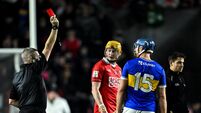Bloody Sunday accused ‘should not be imprisoned’
Those blamed for the events of Bloody Sunday should not face criminal proceedings, veteran civil rights lawyer Sir Louis Blom-Cooper QC said today.
As the 30th anniversary of the Army killings of 13 Catholics in Derry nears, he claimed naming-and-shaming those responsible for their role in the tragic events ought to be enough.













